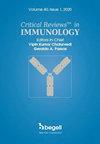薯蓣通过诱导嗜酸性粒细胞凋亡和抑制p38 MAPK信号通路缓解哮喘
IF 0.9
4区 医学
Q4 IMMUNOLOGY
引用次数: 0
摘要
目的:薯蓣(Dioscoreae Nipponicae, RDN)是一种广泛应用于人类疾病治疗的中药。本研究旨在探讨RDN在哮喘中的治疗潜力及其潜在机制。方法:采用卵清蛋白(OVA)刺激建立小鼠哮喘模型。采用HE染色检测气管组织病理损伤情况。Western blot检测胶原Ⅰ、FN1、α-SMA(气道重塑标志物)、p-p38 (p38 MAPK通路标志物)蛋白的表达。然后从模型小鼠中分离嗜酸性粒细胞。CCK-8和流式细胞术分别检测细胞活力和ROS水平。采用qRT-PCR检测嗜酸性粒细胞中GPX4、ACSL4(铁下垂标志物)mRNA表达。结果:RDN显著降低ova诱导小鼠BALF总细胞数和嗜酸性粒细胞数量,抑制炎症细胞浸润,下调重塑标志物胶原Ⅰ、FN1、α-SMA。在模型小鼠中,RDN干预可阻断p38 MAPK通路,其阻断可减弱ova诱导哮喘的不良表现。此外,RDN在体外和体内均可诱导嗜酸性细胞铁下垂。阻断p38 MAPK通路也增强了体外嗜酸性粒细胞的铁沉,细胞活力和GPX4表达降低,ROS水平和ACSL4表达增加。结论:RDN通过抑制p38 MAPK通路诱导嗜酸性粒细胞铁下垂,有助于哮喘的缓解。本文章由计算机程序翻译,如有差异,请以英文原文为准。
Rhizoma Dioscoreae Nipponicae relieves asthma through inducing the ferroptosis of eosinophils and inhibiting the p38 MAPK signaling pathway
Objectives: Rhizoma Dioscoreae Nipponicae (RDN) is a traditional Chinese medicine that widely applied in the treatment of human diseases. This study aims to explore the therapeutic potential of RDN in asthma and the underlying mechanisms.
Methods: A mouse model of asthma was established by the stimulation of ovalbumin (OVA). HE staining was performed to detect the pathological injuries of tracheal tissues. The protein expression of collagen Ⅰ, FN1, α-SMA (airway remodeling markers), and p-p38 (a marker of the p38 MAPK pathway) were detected by Western blot. Eosinophils were then isolated from the model mice. Cell viability and ROS level were measured by CCK-8 and Flow cytometry, respectively. The mRNA expression of GPX4 and ACSL4 (ferroptosis markers) in eosinophils were measured by qRT-PCR.
Results: RDN significantly reduced the numbers of total cells and eosnophils in BALF, inhibited inflammatory cell infiltration, and down-regulated remodeling markers (Collagen Ⅰ, FN1, and α-SMA) in OVA-induced mice. The p38 MAPK pathway was blocked by the intervention of RDN in the model mice, and its blocking weakens the poor manifestations of OVA-induced asthma. In addition, RDN induced the ferroptosis of eosnophils both in vitro and in vivo. Blocking of the p38 MAPK pathway also enhanced the ferroptosis of eosnophils in vitro, evidenced by the decreased cell viability and GPX4 expression, and increased ROS level and ACSL4 expression.
Conclusion: RDN induced the ferroptosis of eosinophils through inhibiting the p38 MAPK pathway, contributing to the remission of asthma.
求助全文
通过发布文献求助,成功后即可免费获取论文全文。
去求助
来源期刊
CiteScore
2.60
自引率
0.00%
发文量
14
审稿时长
>12 weeks
期刊介绍:
Immunology covers a broad spectrum of investigations at the genes, molecular, cellular, organ and system levels to reveal defense mechanisms against pathogens as well as protection against tumors and autoimmune diseases. The great advances in immunology in recent years make this field one of the most dynamic and rapidly growing in medical sciences. Critical ReviewsTM in Immunology (CRI) seeks to present a balanced overview of contemporary adaptive and innate immune responses related to autoimmunity, tumor, microbe, transplantation, neuroimmunology, immune regulation and immunotherapy from basic to translational aspects in health and disease. The articles that appear in CRI are mostly obtained by invitations to active investigators. But the journal will also consider proposals from the scientific community. Interested investigators should send their inquiries to the editor before submitting a manuscript.

 求助内容:
求助内容: 应助结果提醒方式:
应助结果提醒方式:


